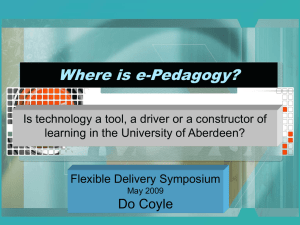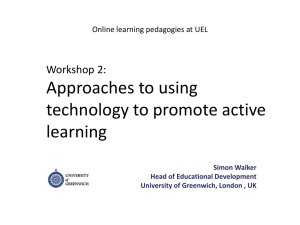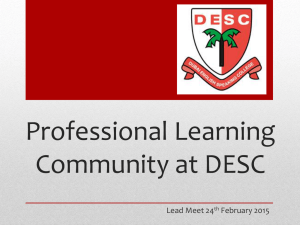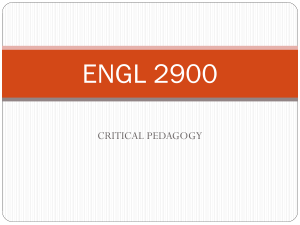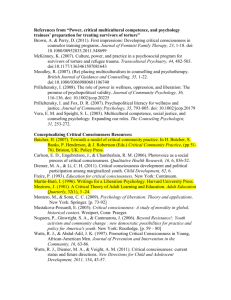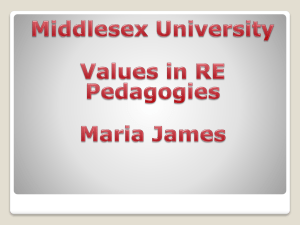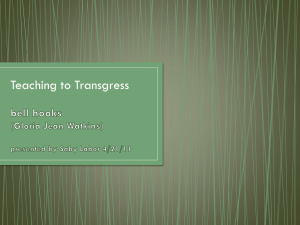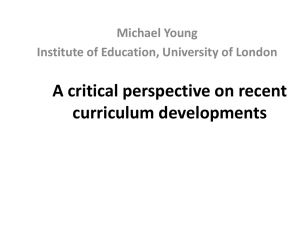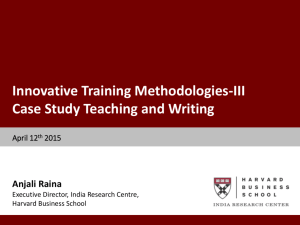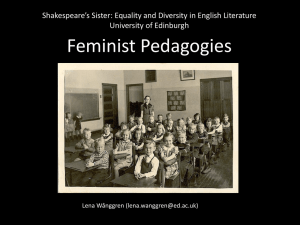Presentation
advertisement
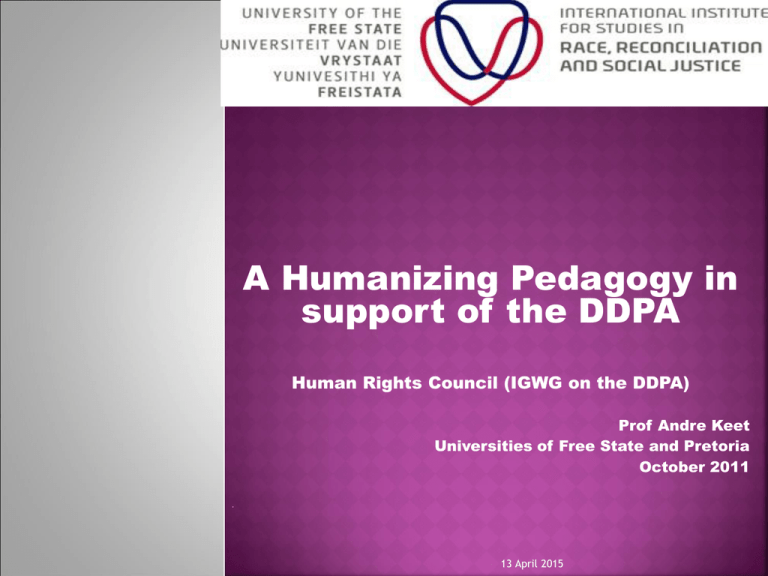
A Humanizing Pedagogy in support of the DDPA Human Rights Council (IGWG on the DDPA) Prof Andre Keet Universities of Free State and Pretoria October 2011 . 13 April 2015 The human? Meaning of HP Development of HP [Ex] changing pedagogies The nature of HP Practical Principles Conceptual Principles 13 April 2015 What is the human? Where is the human? Humans are animals of culture/ active agents who create cultures In systems that they create Developments in biogenetics, biotechnology, bio-prospecting/ In structures that they develop to imprison them Bioethics and the concept of ‘dignity’ vs personal autonomy In Derrida’ text from where language speaks us (not us speaking it) Technology In Foucault’ discourses ... As by products of discursive regimes Human genome projects ... Reaffirming “race” Becoming machine Ethics ... “Reflections from a damage life” Human consciousness follows production 13 April 2015 Meaning of ‘human’: French: ‘humain’ … of or belonging to ‘man’ Latin: ‘humanus’ … related to homo … ‘man’ humus "earth" … notion of "earthly beings” Meaning of ‘ize’: Suffix forming verbs/ thus to ‘imbue with humaneness’ Pedagogy: “Art of teaching” Humanizing Pedagogy: Art of teaching that is ‘imbued with and advances humaneness’ … a pedagogy that ‘cultivates humanity’ (Nussbaum) 13 April 2015 Dominance of Behaviourist Pedagogies 1990 1970 Critical Pedagogy/ the work of Freire and others 1960-1970 1960 1950’s Biomedical concern for cure Concern for humane healing Attempts to merge critical and humanizing pedagogies HP emerged within the health and medical Progressive Education Theories sciences Postcolonial/ poststructuralist ET Positivist Education Theory 13 April 2015 Fundamental pedagogics Critical Pedagogy Pedagogy of Hospitality Messianic Pedagogy Post-structural/ postcolonial pedagogies Pedagogy of discomfort Hopeful pedagogies Pedagogies of nostalgia Post-conflict pedagogies Humanizing pedagogies 13 April 2015 “Humanization “A is the ontological vocation of ‘man’”. humanising pedagogy expresses the consciousness of the students”. (Freire, 1970) 13 April 2015 “There is no learning or humanization without the act of mutual dialogue. Yet for dialogue to be transformative it needs to be carried out in relations of love, mutual respect, and trust. If the capacity to dialogue offers an alternative to the ‘‘banking concept’’ of education, it does so because it no longer reduces the oppressed human being to the status of a thing or object”. (Freire, 1970) 13 April 2015 A “humanizing pedagogy” is a pedagogy in which the whole person develops and they do so as their relationships with others evolve and enlarge. Hence the teacher and the teacher’s development become part of the equation. Humanizing pedagogy becomes a process of becoming for all parties. (Price and Osborne, 2006) 13 April 2015 Courageously humane teaching – borne of a commitment not only to transfer specific and meaningful academic knowledge but to further the overall wellness of human beings – is needed by all students [and teachers]. (Michael Mwangaza, 2006) 13 April 2015 A humanizing, democratic education needs to emphasize the multiple possibilities of agency as well as the hope of living in a more emancipated society. A democratic education would seek to develop a process of learning that assisted public forms of participation but also enabled students to produce new forms of democratic knowledge. (Giroux, 2006) 13 April 2015 A humanizing pedagogy will point us toward a world that is more harmonious and more humane, less discriminatory, and more just. (Donaldo Macedo, 2006) 13 April 2015 Participatory, Affective, Problem-posing, Situated, The Pedagogical Encounter should be Multicultural, Dialogic, De-socializing, Democratic, Researching, Interdisciplinary, and; Activist 13 April 2015 Communicating expectations; Providing constructive feedback; Designing teaching methods that consider: diverse learning styles, abilities, ways of knowing, and previous experience and background knowledge; Creating multiple ways for students to demonstrate their knowledge 13 April 2015 PCS model of exclusion/ inclusion: Personal/ psychological exclusion: thoughts, feelings, actions, prejudice, attitudes: etc. Cultural exclusion through shared ways of seeing, thinking and doing … normative frames as the “totality of background meanings, norms, discourses, and practices” to “which the self orient itself” Structural exclusion though networks of social divisions and social forces sewn into fabric of society 13 April 2015 Social justice … … generally refers to the idea of creating a society or institution that is based on the principles of equality and solidarity, that understands and values human rights, and that recognizes the dignity of every human being. 13 April 2015 Mutual Vulnerability Students must suspend their cultural default drive (that critical minimum of ways, customs, manners, gestures and postures that facilitate uninhibited, unselfconscious action) in favour of that of the lecturer … this is the burdensome condition of critical selfconsciousness. Some students are included (and advantaged) since they share the cultural default drive of the lecturer/ institution Others are excluded … (and disadvantaged) Through mutual vulnerability the burden of constant selfconsciousness must be shared between lecturers and students and amongst students…to work against cultural arrogance and the normative frames of the dominant cultures 13 April 2015 Challenging Epistemic Injustice (Fricker, 2007) EI refers to a wrong done to someone specifically in their capacity as a knower One form of epistemic injustice is testimonial injustice which occur… when prejudice causes a hearer to give a deflated level of credibility to a speaker’s word (for example, you are less believable as a speaker or writer when you are black). 13 April 2015 Curriculum as Discourse Refers to the relationships between disciplines, curriculum, courses, vocations and the professional, intellectual and institutional practices that create and maintain modes of classification, control and containment that construct disciplinary and professional identities along social, economic, cultural, racial and other fault-lines already resident in society. Exclusion is already facilitated by the way in which curricula and disciplines are organised!! 13 April 2015 Understanding Power and Privilege Social practices, like education, are supported by power arrangements Power refers to relations based on social, political and material asymmetries (structural and otherwise)… by which some are rewarded and others are sanctioned. These asymmetries allow the workings of social systems to perpetuate privilege …/ and inequalities 13 April 2015
